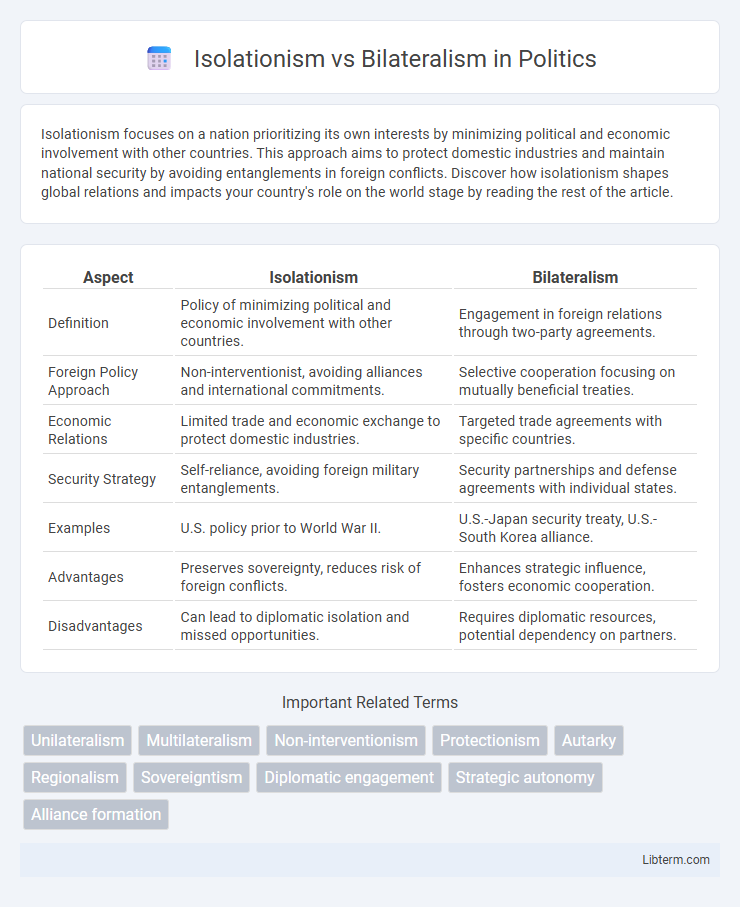Isolationism focuses on a nation prioritizing its own interests by minimizing political and economic involvement with other countries. This approach aims to protect domestic industries and maintain national security by avoiding entanglements in foreign conflicts. Discover how isolationism shapes global relations and impacts your country's role on the world stage by reading the rest of the article.
Table of Comparison
| Aspect | Isolationism | Bilateralism |
|---|---|---|
| Definition | Policy of minimizing political and economic involvement with other countries. | Engagement in foreign relations through two-party agreements. |
| Foreign Policy Approach | Non-interventionist, avoiding alliances and international commitments. | Selective cooperation focusing on mutually beneficial treaties. |
| Economic Relations | Limited trade and economic exchange to protect domestic industries. | Targeted trade agreements with specific countries. |
| Security Strategy | Self-reliance, avoiding foreign military entanglements. | Security partnerships and defense agreements with individual states. |
| Examples | U.S. policy prior to World War II. | U.S.-Japan security treaty, U.S.-South Korea alliance. |
| Advantages | Preserves sovereignty, reduces risk of foreign conflicts. | Enhances strategic influence, fosters economic cooperation. |
| Disadvantages | Can lead to diplomatic isolation and missed opportunities. | Requires diplomatic resources, potential dependency on partners. |
Understanding Isolationism: Definition and Historical Context
Isolationism refers to a national policy of avoiding political or economic entanglements with other countries, prioritizing self-sufficiency and non-involvement in external conflicts. Historically, the United States practiced isolationism during the 19th and early 20th centuries, notably with the Monroe Doctrine and avoiding participation in both World Wars until late stages. This approach aimed to protect national interests by minimizing foreign influence and preserving internal stability.
What is Bilateralism? Key Principles and Examples
Bilateralism refers to the political, economic, or diplomatic relations between two sovereign states that agree to cooperate on specific issues or policies. Key principles include mutual benefit, reciprocity, and direct negotiation, facilitating tailored agreements such as trade deals, security pacts, or environmental accords. Examples of bilateralism include the U.S.-Japan Security Treaty and the Canada-U.S. Free Trade Agreement, both emphasizing cooperation without multilateral complexities.
Key Differences Between Isolationism and Bilateralism
Isolationism emphasizes minimizing foreign involvement and avoiding alliances to maintain national sovereignty and reduce external conflicts, whereas bilateralism prioritizes forming partnerships and agreements between two countries to enhance cooperation and address mutual interests. Isolationism restricts economic and political interactions, focusing on self-sufficiency, while bilateralism encourages targeted diplomacy and trade relationships to foster stability and development. The key difference lies in isolationism's preference for withdrawal from global affairs versus bilateralism's strategic engagement with selected nations.
Historical Case Studies: Nations Practicing Isolationism
Japan's Tokugawa shogunate embraced isolationism from the 17th to mid-19th century, enforcing the sakoku policy that severely restricted foreign trade and diplomacy to preserve internal stability and cultural identity. Similarly, the United States adopted isolationist tendencies between World War I and World War II, exemplified by the Neutrality Acts of the 1930s aimed at avoiding entanglement in European conflicts. Both historical cases highlight how nations pursued isolationism to concentrate on domestic affairs while minimizing foreign influence during volatile international periods.
Notable Bilateral Agreements in Modern Diplomacy
Notable bilateral agreements in modern diplomacy include the U.S.-China Phase One Trade Deal, which aimed to reduce trade imbalances and enforce intellectual property protections. The Comprehensive Economic and Trade Agreement (CETA) between Canada and the European Union exemplifies deep bilateral cooperation fostering economic integration and regulatory alignment. These agreements highlight the strategic preference for focused, reciprocal partnerships over isolationist policies in global economic and political relations.
Economic Impacts: Isolationism vs Bilateralism
Isolationism restricts international trade, often leading to reduced market access and limited economic growth due to protectionist policies and lack of foreign investment. Bilateralism encourages trade agreements between two countries, enhancing economic cooperation, boosting exports, and attracting foreign direct investment through mutually beneficial terms. Economies engaged in bilateral agreements typically experience increased competitiveness and diversified markets, contributing to higher GDP growth compared to isolationist counterparts.
Security Considerations: National Defense and International Relations
Isolationism prioritizes minimizing foreign entanglements to reduce national security risks, emphasizing self-reliant defense capabilities and limiting international military commitments. Bilateralism enhances national defense through strategic partnerships and alliances, facilitating intelligence sharing, joint military exercises, and coordinated responses to global threats. The choice between isolationism and bilateralism fundamentally shapes a nation's ability to manage security threats and maintain influence in international relations.
Social and Cultural Consequences of Isolationist Policies
Isolationist policies often lead to limited cultural exchange, resulting in reduced diversity and slower social innovation within a nation. By minimizing international interaction, societies may experience increased ethnocentrism and diminished global awareness, which can hinder the development of multicultural understanding. This isolation can also restrict access to foreign ideas, technologies, and social movements, ultimately affecting cultural evolution and societal progress.
Globalization Challenges: Can Bilateralism Offer a Middle Ground?
Bilateralism provides a strategic framework to navigate globalization challenges by fostering targeted agreements between two countries, allowing tailored responses to economic and political complexities that isolationism overlooks. Unlike isolationism's risk of economic stagnation, bilateralism supports selective cooperation, balancing national sovereignty with global engagement to address trade barriers, intellectual property, and security concerns. This approach offers a pragmatic middle ground, enabling nations to mitigate globalization's uncertainties while preserving control over critical policy areas.
Future Trends: Is the World Moving Towards Isolationism or Bilateralism?
Future geopolitical dynamics indicate a stronger tilt towards bilateralism as nations prioritize strategic partnerships over unilateral isolationism. Growing economic interdependence and complex global challenges such as climate change and cybersecurity demand cooperative frameworks tailored to specific country-to-country agreements. Data from recent trade policies and diplomatic engagements highlight an increase in bilateral treaties, suggesting a trend away from isolationism towards more selective, but intensive, collaborative relations.
Isolationism Infographic

 libterm.com
libterm.com